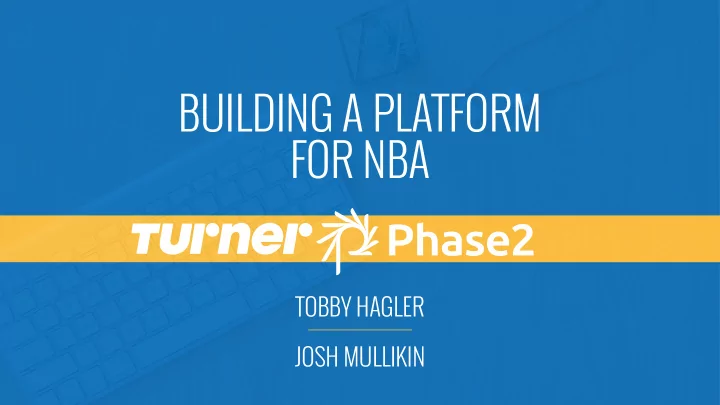

BUILDING A PLATFORM FOR NBA TOBBY HAGLER JOSH MULLIKIN
BUILDING A PLATFORM FOR NBA Unified platform driving web, mobile, big screen Integrate live data, editorial content, live video, & on-demand video Fast-paced editorial workflow Fast-breaking performance
INTEGRATION STRATEGY External live data Editorial content On-demand Video Live video
Initial nearly-headless strategy Evolved to multi-headed approach (hydrupal) Media import
ON THE BLEEDING EDGE Drupal 8 & PHP 7 Angular 2 Content API (Nodejs & Elasticsearch) Cloud (AWS & Docker) Redis
DRUPAL 8 Content Strategy
PARAGRAPHS AND PAGE LAYOUT
CONTENT COLLECTIONS
VIDEO
EDITORIAL EXPERIENCE Nothing between the editor and the content
Paragraphs for layout Generic, multi-purpose Slice Why no Panels?
Content bin, and media import Media embed and syndicated content
ANGULAR 2 Bringing content and external data together in the browser
REDUX MODEL OF DATA STORAGE Data Storage Data Efficiency Performance Benefits
GAME DETAILS AND LIVE SCORING This is an example of using Redux model and Angular 2 Live updates and game data comes from external services
API No SQL queries between he fan and the game
API - NODEJS & ELASTICSEARCH Denormalized data Microservices
CLOUD Building a new home for Drupal with Docker & AWS
DOCKER Run same Drupal infrastructure local & in production Compute density Makes CI easy Docker-compose allows local development setup with supporting services in minutes
AWS ECS CloudFormation Code Pipeline S3
FAST Make Drupal 8 Even Faster
BONUS Git workflow for continuous integration
MAKING PHP7 with opcache DRUPAL 8 Get cache & temporary data out of SQL Right-size Caching FASTER Assemble content where appropriate (combination of Server, Edge, and Client) Horizontal DB scaling (easier said than done) Role separation publish, WWW, and utility containers Moving sessions out of the database
CONSTANT SPEED IMPROVEMENTS
REDIS Get cache out of SQL
settings.php CONFIGURING REDIS // Allow the services to work before the Redis module itself is enabled. $class_loader->addPsr4('Drupal\\redis\\', 'modules/contrib/redis/src'); $settings['container_yamls'][] = './services.redis.yml'; $settings['container_yamls'][] = 'modules/contrib/redis/example.services.yml'; $settings['container_yamls'][] = 'modules/contrib/redis/redis.services.yml'; $settings['redis.connection']['interface'] = 'PhpRedis'; services.redis.yml $settings['redis.connection']['host'] = $_ENV['REDIS_HOST']; $settings['cache']['default'] = 'cache.backend.redis'; $settings['cache_prefix'] = $_ENV['SITE_URL']; $conf['redis_flush_mode'] = 1; // Always set the fast backend for bootstrap, discover and config, otherwise // this gets lost when redis is enabled. $settings['cache']['bins']['bootstrap'] = 'cache.backend.chainedfast'; services: $settings['cache']['bins']['discovery'] = 'cache.backend.chainedfast'; $settings['cache']['bins']['config'] = 'cache.backend.chainedfast'; # Cache tag checksum backend. Used by redis and most other cache backend $settings['cache']['bins']['render'] = 'cache.backend.chainedfast'; # to deal with cache tag invalidations. $settings['cache']['bins']['container'] = 'cache.backend.chainedfast'; cache_tags.invalidator.checksum: $settings['cache']['bins']['data'] = 'cache.backend.chainedfast'; class: Drupal\redis\Cache\RedisCacheTagsChecksum $settings['cache']['bins']['toolbar'] = 'cache.backend.redis'; arguments: ['@redis.factory'] $settings['cache']['bins']['menu'] = 'cache.backend.redis'; tags: $settings['cache']['bins']['entity'] = 'cache.backend.redis'; - { name: cache_tags_invalidator } $settings['cache']['bins']['default'] = 'cache.backend.redis'; // Use redis for container cache. # Replaces the default lock backend with a redis implementation. $settings['bootstrap_container_definition'] = [ 'parameters' => [], lock: 'services' => [ class: Drupal\Core\Lock\LockBackendInterface 'redis.factory' => [ factory: ['@redis.lock.factory', get] 'class' => 'Drupal\redis\ClientFactory', ], # Replaces the default persistent lock backend with a redis implementation. 'cache.backend.redis' => [ lock.persistent: 'class' => 'Drupal\redis\Cache\CacheBackendFactory', class: Drupal\Core\Lock\LockBackendInterface 'arguments' => ['@redis.factory', '@cache_tags_provider.container', factory: ['@redis.lock.factory', get] '@serialization.phpserialize'], arguments: [true] ], 'cache.container' => [ 'class' => '\Drupal\redis\Cache\PhpRedis', # Replaces the default flood backend with a redis implementation. 'factory' => ['@cache.backend.redis', 'get'], flood: 'arguments' => ['container'], class: Drupal\Core\Flood\FloodInterface ], factory: ['@redis.flood.factory', get] 'cache_tags_provider.container' => [ 'class' => 'Drupal\redis\Cache\RedisCacheTagsChecksum', 'arguments' => ['@redis.factory'], ], 'serialization.phpserialize' => [ 'class' => 'Drupal\Component\Serialization\PhpSerialize', ], ], ];
Q&A Thank You!
Recommend
More recommend